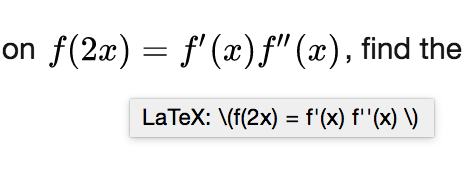Polynomial Function
If a non-zero polynomial f ( x ) satisfies the condition f ( 2 x ) = f ′ ( x ) f ′ ′ ( x ) , find the value of f ( 3 ) .
The answer is 12.
This section requires Javascript.
You are seeing this because something didn't load right. We suggest you, (a) try
refreshing the page, (b) enabling javascript if it is disabled on your browser and,
finally, (c)
loading the
non-javascript version of this page
. We're sorry about the hassle.
2 solutions
Use \implies for ⟹ symbol.
Note that the case of "n=0" has to be dealt with separately, since the degree of the 0 polynomial is not -1.
This is why your solution missed the crucial requirement that the polynomial is "non-zero".
Is f ( x ) = 0 a polynomial too? If so, the answer could be 1 2 or 0
Read question one more time..it's written that if f(x) be a non zero polynomial.
Log in to reply
I didn't see it when I answer it......
Log in to reply
The problem was edited after the "solution" was posted. Those who answered 0 have been marked correct.
In future, if you spot any errors with a problem, you can “report” it by selecting "report problem" in the menu. This will notify the problem creator who can fix the issues.
Log in to reply
@Calvin Lin – If I have problems with Latex, where I do report it? (Just kidding). I need the codes of Latex because the ones I know uses the $$$ sign. Where can I find helpful hints with latex codes. Thanks.
Log in to reply
@Hana Wehbi – We use \ ( \ )instead of $ $ to surround Latex. Otherwise, the "codes" are all the same.
You can hover your mouse over the Latex image to see the underlying code.
E.g.

Log in to reply
@Calvin Lin – Thanks, that was really helpful. I will give it a try.
Let degree of function = n
therefore, D E G f ( 2 x ) = n
D E G f ′ ( x ) = ( n − 1 )
D E G f ′ ′ ( x ) = ( n − 2 )
so,
n = ( n − 1 ) + ( n − 2 )
=> n = 3
let f ( x ) = a x 3 + b x 2 + c x + d
=> f ( 2 x ) = 8 a x 3 + 4 b x 2 + 2 c x + d
also, f ′ ( x ) = 3 a x 2 + 2 b x + c
and f ′ ′ ( x ) = 6 a x + 2 b
as f ( 2 x ) = f ′ ( x ) . f ′ ′ ( x )
=> 8 a x 3 + 4 b x 2 + 2 c x + d = ( 3 a x 2 + 2 b x + c ) ( 6 a x + 2 b ) )
by comparing the coeffs.
8 a = 1 8 a 2
=> a = 9 4
also, b = c = d = 0
therefore,
f ( x ) = 9 4 x 3
therefore,
f ( 3 ) = 9 4 * 3 3
=> f ( 3 ) = 1 2 .